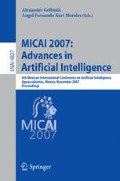Abstract
The purpose of this paper is to present in an organized form the concept of cancer detection based on data obtained from SELDI-TOF-MS. In this paper, we outline the full process of detection: from raw data, through pre-processing towards classification. Methods and algorithms, their characteristics and suggested implementation indications are described. We aim to present the state of the art over current research. Additionally, we introduce an idea of 24h/day distributed work organization and suggest how to make the research process faster.
Access this chapter
Tax calculation will be finalised at checkout
Purchases are for personal use only
Preview
Unable to display preview. Download preview PDF.
References
Vorderwülbecke, S., Cleverley, S., Weinberger, S.R., Wiesner, A.: Protein quantification by the seldi-tof-ms-based proteinchip system. Nature Methods 2 (2005)
Coombes, K.R., Tsavachidis, S., Morris, J.S., Baggerly, K.A., Hung, M.-C., Kuerer, H.M.: Improved peak detection and quantification of mass spectrometry data acquired from surface-enhanced laser desorption and ionization by denoising spectra with the undecimated discrete wavelet transform. Proteomics 5(16) (2005)
Satten, G.A., Datta, S., Moura, H., Woolfitt, A.R., da Carvalho, M.G., Carlone, G.M., De Barun, K., Pavlopoulos, A., Barr1, J.R.: Standardization and denoising algorithms for mass spectra to classify whole-organism bacterial specimens. Bioinformatics 20(17) (2004)
Smith, L.I.: A tutorial on Principal Components Analysis (2002)
Ball, G., Mian, S., Holding, F., Allibone, R.O., Lowe, J., Ali, S., Li, G., McCardle, S., Ellis, I.O., Creaser, C., Rees, R.C.: An integrated approach utilizing artificial neural networks and seldi mass spectrometry for the classification of human tumours and rapid identification of potential biomarkers. Bioinformatics 18(3) (2002)
Zhou, Z.-H., IEEE, S.M., Liu, X.-Y.: Training cost-sensitive neural networks with methods addressing the class imbalance problem. IEEE Transactions on Knowledge and Data Engineering (2005)
Yu, J., Chen, X.-W.: Bayesian neural network approaches to ovarian cancer identification from high-resolution mass spectrometry data. Bioinformatics 1 (2005)
Jeffries, N.O.: Performance of a genetic algorithm for mass spectrometry proteomics. BMC Bioinformatics (2004)
Boisson, J.-C., Jourdan, L., Talbi, E.-G., Rolando, C.: Protein sequencing with an adaptive genetic algorithm from tandem mass spectrometry. Evolutionary Computation (2006)
Lilien, R.H., Farid, H., Donald, B.R.: Probabilistic disease classification of expression-dependent proteomic data from mass spectrometry of human serum. Journal of Computational Biology 10(6) (2003)
Vitzthum, F., Behrens, F., Anderson, A.N., Shaw, J.H.: Proteomics: From basic research to diagnostic application a review of requirements and needs. Journal of Proteome 4 (2005)
Chaczko, Z., Klempous, R., Nikodem, J., Rozenblit, J.: 24/7 software development in virtual student exchange groups: Redefining thework and study week. In: ITHET 7th Annual International Conference, Sydney, Australia (2006)
Gupta, A., Seshasai, S., Arun, R.: Toward the 24-hour knowledge factory – a prognosis of practice and a call for concerted research (2006)
Author information
Authors and Affiliations
Editor information
Rights and permissions
Copyright information
© 2007 Springer-Verlag Berlin Heidelberg
About this paper
Cite this paper
Radlak, M., Klempous, R. (2007). SELDI-TOF-MS Pattern Analysis for Cancer Detection as a Base for Diagnostic Software. In: Gelbukh, A., Kuri Morales, Á.F. (eds) MICAI 2007: Advances in Artificial Intelligence. MICAI 2007. Lecture Notes in Computer Science(), vol 4827. Springer, Berlin, Heidelberg. https://doi.org/10.1007/978-3-540-76631-5_108
Download citation
DOI: https://doi.org/10.1007/978-3-540-76631-5_108
Publisher Name: Springer, Berlin, Heidelberg
Print ISBN: 978-3-540-76630-8
Online ISBN: 978-3-540-76631-5
eBook Packages: Computer ScienceComputer Science (R0)

